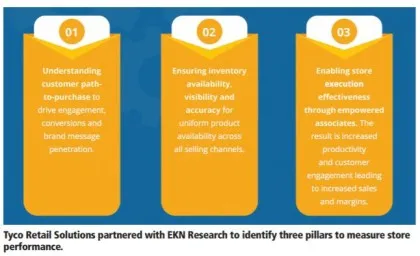
Tyco Retail Solutions and EKN introduce performance scorecard
New metrics provide measurements to understand customer path to purchase, ensure inventory availability and enable associate empowerment.
Tyco Retail Solutions recently partnered with EKN Research to identify key issues driving the need for an improved retail key performance indicator (KPI) and performance culture.
The research e-book, A New Store Excellence Scorecard, defines three pillars to measure store performance and new associated KPIs which provide a foundation to better evaluate business results. By monitoring these insights through real-time in-store data, retailers can make immediate changes and stay ahead in today’s highly competitive unified commerce environment, said the companies.
“In this new digital-driven age, retailers need to re-think store performance management and excellence. By blending essential real-time operational data and customer knowledge, retailers can be in a better position to navigate business complexities. This e-book underscores the value of new KPIs and measurements to provide a new performance scorecard for retailers,” said Sahir Anand, managing vice-president, research and principal analyst, EKN Research.
Ways to measure store performance
Understanding customer pathto-purchase: In the era of omni-channel shopping and multiple brand touchpoints, retailers are struggling to understand customer buying behaviours. Findings indicate that nearly 50% of retailers are unable to predict shopper traffic, making it difficult to balance between operational tasks and customer service.
Real-time data combined with new key metrics related to in-store mobility, promotional effectiveness, conversion rates and shopper behaviour enable retailers to deliver a more seamless, personalised customer experience and increase sales conversions.
Ensuring inventory accuracy and availability: EKN reported only 40% of retailers consistently manage inventory performance and turnover metrics at the store level. Inventory is the foundation for retail regardless of channel and having accurate availability and access is crucial to success, added EKN.
Some of the new KPIs for scoring the return on investment (ROI) of store inventory include available to promise (ATP), merchandise effectiveness and inventory turn, and order fulfilment cost and cycle time. Enterprise-wide access to the “right inventory at the right time” is important to both the in-store and omnichannel customer experience.
Enabling store execution through empowered employees: Employee engagement and optimum labour hour utilisation are effective tools for driving consistent execution and customer satisfaction. However, research indicated that retailers spend 70% of their labour hours dealing with operational tasks and only 30% on customer service.
According to the research, some new actionable KPIs that are effective in understanding operational and shopper satisfaction issues and the most effective allocation of associate time include engagement rates, schedule effectiveness and labour cost to sales ratios, to name a few.
“As store processes and technologies continue to evolve, retailers can address gaps within store metrics, KPIs and related performance improvement processes that affect associates and customers every day,” said Tony D'Onofrio, chief customer officer, Tyco Retail Solutions. “By focusing on the three pillars of retail operations, retailers can create a holistic performance management strategy and a better balance between sales and operational effectiveness.”



















 Advertise
Advertise






